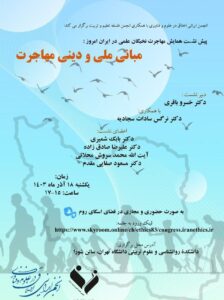
A Religious Perspective on the Phenomenon of Migration and Human Capital Flight (Brain Drain)
This is a summary of a speech delivered by Ustad Soroush Mahallati in University of Tehran. The topic of the conference was National and Religious Foundations of Migration.
Positive Migration
Migration is discussed in Islamic texts with a positive outlook and is emphasized alongside faith and jihad (e.g., “Those who believed, emigrated, and strove...” Surah Anfal: 72, 74; Surah Tawbah: 20). In this type of migration, a Muslim leaves a land governed by disbelief to join a Muslim community, enabling them to fulfill their duties and become an active member of the Islamic society. However, today migration has taken on other forms that require examination from an Islamic perspective.
Individual Aspects of Migration
In one type of migration, a Muslim leaves their Islamic homeland to live in a non-Islamic land. This migration has individual and social dimensions.
From an individual perspective, one must consider whether living in the destination country will negatively affect the person’s beliefs, morals, and behavior. If it poses such a risk, preserving one’s faith and morals holds such value that migration should be avoided. If the religious harm is limited to neglecting some practical obligations, the ruling may vary based on the importance and necessity of the migration.
Social Aspects of Migration
From a social perspective, it is essential to assess the void or deficiency migration creates in the Islamic community. Does it leave essential duties unfulfilled? Does the migrant’s departure harm their moral and human commitments to their homeland? The answers depend on the roles individuals play in their society, and therefore, a universal ruling cannot apply to everyone.
Migration: A Right and a Duty
While choosing where to live is a “right” and implies the freedom to “choose,” this right cannot be viewed in isolation from duties or in conflict with them. Thus, in deciding to migrate or stay, ethical, religious, and national responsibilities must also be considered. In cases of conflict, one might be ethically encouraged to stay in their homeland, but it is not always permissible to deny someone their right to migrate, especially when migration enables personal growth and activity that stagnation at home would hinder.
In these conflicts, migration often becomes an involuntary act for those who love their homeland but are compelled to leave due to circumstances.
Forced Migration
Forced migration can occur due to social, economic, or security instability, compelling individuals to leave their homeland. In the past, events like famine, disease outbreaks, or tyrannical rulers forced many to migrate. In such situations, it is unreasonable to advise people to endure hardships and remain in their homeland. Migration in these cases is not unethical, and Islamic law, under principles like “no harm” (la dharar) and “no hardship” (la haraj), permits migration to alleviate burdens and allows people the right to seek a less arduous life elsewhere.
Political and Religious Migration
In cases of forced migration, governments play a critical role. Economic, cultural, or political pressures from the state may drive migration decisions. Rather than encouraging citizens to endure hardships and to avoid migration, governments should focus on reforming their policies and alleviating these pressures.
If, however, some of these policies are rooted in definitive religious rulings, what is the government’s responsibility? Should it adjust its religious approach to prevent the mass migration of elites and preserve human capital, or should it persist in its policies and accept the loss of these assets?
Preferring the latter option not only harms national resources but could also lead to societal collapse. Even if certain Islamic practices are preserved, the broader degradation of society and the eventual erosion of religious foundations cannot be prevented.
In such conditions, it is unwise to insist on implementing religious rulings at any cost. Instead, policies must balance respect for legitimate rights and freedoms with efforts to “preserve the faith” of citizens while avoiding harm to it. Additionally, the broader interests of society and governance should not be overlooked.
Sayyid Ali studied in the seminary of Qom from 2012 to 2021, while also concurrently obtaining a M.A in Islamic Studies from the Islamic College of London in 2018. In the seminary he engaged in the study of legal theory, jurisprudence and philosophy, eventually attending the advanced kharij of Usul and Fiqh in 2018. He is currently completing his Masters of Education at the University of Toronto and is the head of a private faith-based school in Toronto, as well as an instructor at the Mizan Institute and Mufid Seminary.

